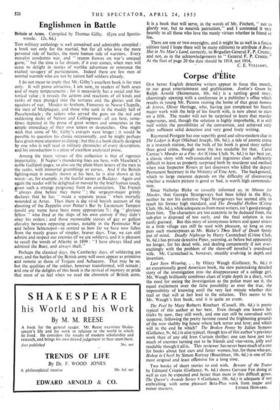Englishmen in Battle
Tins military anthology is well conceived and admirably compiled : a book not only for the martial, 'but for all who love the more personal side of battles, the more human side of warriors. Every moralist condemns war, and " reason frowns on war's unequal game," but the time is far distant, if it ever comes, when men will cease to delight in stories of warlike adventure or renounce the exalted savagery of participation. Indeed there are few men of normal warmth who are not by nature half soldiers already.
I do not mean to imply that Mr. Gilby's excellent book is for men only. It will prove attractive, I am sure,. to readers of both sexes and of many temperaments ; for it necessarily has a social and his- torical value ; it reveals the actions and reactions of all kinds and ranks of men plunged into the tortures and the glories and the squalors of war. Minden to Arnhem, Fontenoy to Neuve Chapelle, the men of Malplaquet, and those who sank in the muddy hell of Passchendaele ; the sailors who served the guns on the red and reddening decks of Nelson and Collingwood--- all are here, some- times depicted in the prose of great writers and sometimes in the simple immediacy of their own letters' or despatches. One might wish that some of Mr. Gilby's extracts were longer ; it would be possible to question his choice occasionally, and he might perhaps have given more attention to dating ; but this is a book clearly designed by one who is well read in military chronicles of every description, and his introduction is a piece of excellent analytical prose.
Among the many virtues of this collection is that of rigorous impartiality. If Napier's thundering lines are here, with Masefield's noble Gallipoli pages, so also are the plain blunt letters of the men in the ranks, with immortal grumblings or curses. And if the British fighting-man is usually shown at his best, he is also shown at his worst—as, for example, in the fearful scenes at Badajoz. Again and again the reader will be delighted or moved by the brief human touch, given such a strange poignancy from its association. The French " always dine before they move " ; the sergeant-major grimly declares that he has " made a separate peace " when mortally wounded at Arras. Then there is _the vivid boyish account of the shooting of the Zeppelin over Potter's Bar by Lieutenant Tempest (could any name have been more appropriate ?) ; tht " glorious fellow " who fired at the ships of his own convoy if-they didn't obey his orders ; and those memorable stories of gay or gallant chivalry between opposing armies, notably in the Peninsular War and before Sebastopol—to remind us how far we have now fallen from the manly graces of simpler, braver days. True, we can still admire and respect our enemies (if we are soldiers), and it is pleasant to recall the words of Allenby in 1899: "1 have always liked and admired the Boer, and always shall."
Perhaps the classical days, the Camberley days, of soldiering are over, and the battles of the British army will soon appear as primitive and remote as those of Trojans and Achaeans. That may be so, but the qualities of the soldier, however transformed, will remain ; and one of the delights of this book is the revival of memory or pride that most of us feel when we read the chronicle of British arms. It is a book that will serve, in the words of Mr. Fitchett, " not to glorify war, but to nourish patriotism," and I commend it very heartily to all those who love the manly virtues whether in friend or foe.
There are one or two oversights, and it might be as well in a future edition (and I hope there will be many editions) to attribute A Brass Hat in No Man's Land, correctly, to Brigadier-General F. P. Crozier, and not, as in the acknowledgements to " General F. P. Cronin." At the foot of page 20 the date should be 1814, not 1914.
C. E. VULLIAMY.


































 Previous page
Previous page